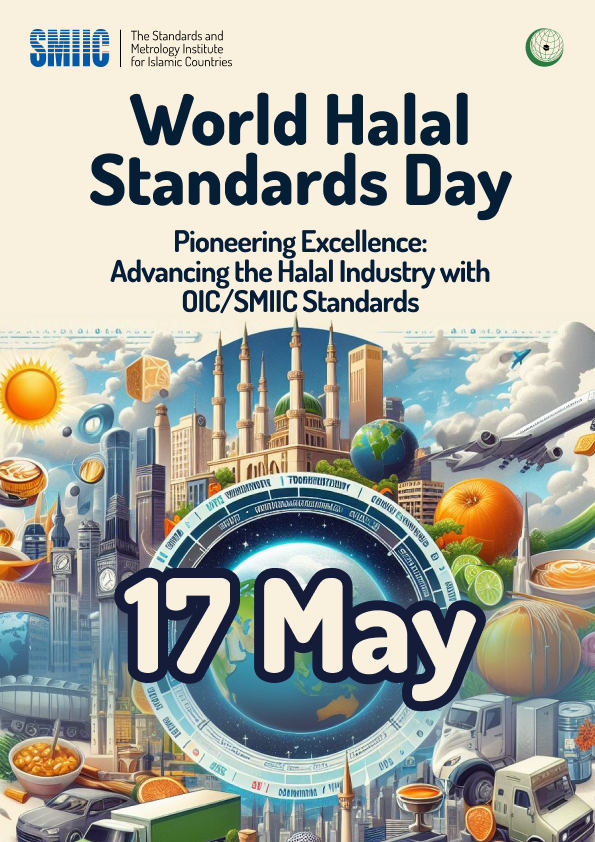اليوم العالمي لمواصفات الحلال

يمثل يوم 17 أيار/مايو يوماً لا يُنسى لأنه يصادف ذكرى اعتماد النسخة الأولى من سلسلة مواصفات الحلال لمنظمة التعاون الإسلامي/المجلس الأعلى الإسلامي للأمن الغذائي العالمي
OIC SMIIC 1, OIC/SMIIC 2 and OIC/SMIIC 3 during the first SMIIC Technical Committee meeting held on 17 May 2011 in Yaoundé/Cameroon.
لذلك، تم الإعلان عن « 17 مايو » من كل عام باعتباره « اليوم العالمي لمعايير الحلال » وهو فرصة لجميع أعضاء منظمة التعاون الإسلامي/المجلس الإسلامي للأمن الغذائي العالمي للترويج لمعايير منظمة التعاون الإسلامي/المجلس الإسلامي للأمن الغذائي العالمي للحلال لصناعة الحلال العالمية، ومخاطبة أصحاب المصلحة الرئيسيين المحتملين ذوي الصلة الذين من شأنهم المساهمة في تعزيز معايير منظمة التعاون الإسلامي/المجلس الإسلامي للأمن الغذائي العالمي للحلال على الصعيدين الوطني والدولي.
موضوع 2024 – الريادة في التميز: النهوض بصناعة الحلال بمعايير منظمة التعاون الإسلامي/المجلس الإسلامي للأمن الغذائي العالمي.
لقد كان تطور صناعة الحلال ملحوظًا، حيث توسعت إلى ما هو أبعد من تركيزها التقليدي على الأغذية فقط لتشمل مجموعة واسعة من المنتجات والخدمات الضرورية لحياة المسلمين. وقد كان هذا التحول مدفوعًا بعوامل مثل التصنيع والعولمة، التي أعادت تشكيل التصنيع وسهلت حركة البضائع والأشخاص في جميع أنحاء العالم.
لذلك، أصبح التوحيد القياسي أمرًا لا غنى عنه لصناعة الحلال، حيث يوفر إطارًا للمهنية وضمان الجودة. منذ إنشائها في عام 2010، ومن خلال مواءمة ممارسات الحلال مع المعايير المعمول بها، يهدف معهد المواصفات والمقاييس للدول الإسلامية إلى إنشاء نظام موثوق وشفاف يغرس الثقة بين المستهلكين ويسهل التجارة في سوق الحلال العالمي.
إن الجمع بين مجالي « الحلال » و »التوحيد القياسي » لا يعزز مصداقية المنتجات والخدمات الحلال فحسب، بل يعزز أيضاً الابتكار والنمو في هذه الصناعة. إن الجهود التي يبذلها المجلس الإسلامي للأمن الغذائي العالمي من خلال مساهمة أصحاب المصلحة المعنيين من أعضائه في إعداد مواصفات منظمة التعاون الإسلامي/المجلس الإسلامي للأمن الغذائي العالمي هي جهود حاسمة للنهوض بمصالح الدول الأعضاء في المنظمة وتعزيز التنمية المستدامة لاقتصاد الحلال على الصعيد العالمي.
Journée mondiale des normes HALAL
La signification du 17 mai marque un jour mémorable car il commémore l’adoption de la version initiale de la série de normes halal OIC/SMIIC : OIC SMIIC 1, OIC/SMIIC 2 et OIC/SMIIC 3 lors de la première réunion du Comité Technique SMIIC tenue le 17 mai 2011 à Yaoundé/Cameroun.
C’est pourquoi le 17 mai de chaque année a été proclamé « Journée mondiale des normes halal » et c’est l’occasion pour tous les membres du SMIIC de promouvoir les normes halal de l’OCI/SMIIC pour l’industrie halal mondiale, en s’adressant aux principales parties prenantes susceptibles de contribuer à la promotion des normes halal de l’OCI/SMIIC à l’échelle nationale et internationale.
Thème 2024 – Pionnier de l’excellence : Faire progresser l’industrie halal grâce aux normes de l’OCI/SMIIC
L’évolution de l’industrie halal a été remarquable, dépassant largement le cadre traditionnel de l’alimentation pour englober un large éventail de produits et de services essentiels à la vie des musulmans. Cette transformation est due à des facteurs tels que l’industrialisation et la mondialisation, qui ont remodelé l’industrie manufacturière et facilité la circulation des biens et des personnes dans le monde entier.
C’est pourquoi la normalisation est devenue indispensable à l’industrie halal, en fournissant un cadre pour le professionnalisme et l’assurance de la qualité. Depuis sa création en 2010, en alignant les pratiques halal sur les normes établies, le SMIIC vise à créer un système fiable et transparent qui inspire confiance aux consommateurs et facilite les échanges au sein du marché halal mondial.
Le rapprochement des domaines du « halal » et de la « normalisation » renforce non seulement la crédibilité des produits et services halal, mais favorise également l’innovation et la croissance au sein de l’industrie. Les efforts du SMIIC à travers la contribution des parties prenantes pertinentes de ses membres dans la préparation des normes OCI/SMIIC sont cruciaux pour faire avancer les intérêts des États membres de l’OCI et promouvoir le développement durable de l’économie halal à l’échelle mondiale.
World HALAL Standards Day
The significance of 17th May marks a memorable day as it commemorates the adoption of the initial version of the OIC/SMIIC halal standards series: OIC SMIIC 1, OIC/SMIIC 2 and OIC/SMIIC 3 during the first SMIIC Technical Committee meeting held on 17 May 2011 in Yaoundé/Cameroon.
Therefore, « 17th May » of each year has been announced as the « World Halal Standards Day » and it is an opportunity to all SMIIC Members to promote OIC/SMIIC Halal Standards for the global Halal Industry, addressing to possible key relevant stakeholders that would contribute to the promotion of the OIC/SMIIC Halal Standards nationally and internationally.
2024 Theme – Pioneering Excellence: Advancing the Halal Industry with OIC/SMIIC Standards
The evolution of the halal industry has been remarkable, expanding far beyond its traditional focus on only food to encompass a wide array of products and services essential to Muslim life. This transformation has been driven by factors like industrialization and globalization, which have reshaped manufacturing and facilitated the movement of goods and people worldwide.
Therefore, standardization has become indispensable to the halal industry, providing a framework for professionalism and quality assurance. Since its establishment in 2010, by aligning halal practices with established standards, SMIIC aims to create a reliable and transparent system that instills confidence among consumers and facilitates trade within the global halal market.
Bringing together the realms of « halal » and « standardization » not only enhances the credibility of halal products and services but also fosters innovation and growth within the industry. SMIIC’s efforts through the contribution of relevant stakeholders of its members in the preparation of OIC/SMIIC Standards are crucial for advancing the interests of OIC member states and promoting the sustainable development of the halal economy globally.